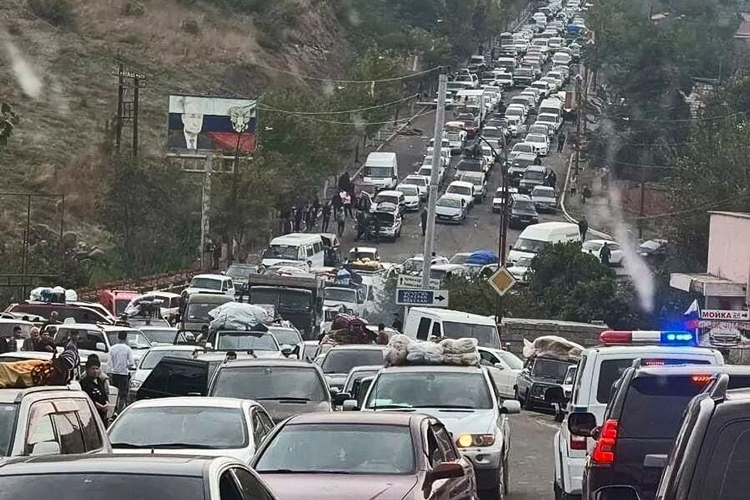After months of economic blockade, Turkish-backed Azerbaijani forces attacked and seized the ethnic Armenian-controlled enclave of Nagorno-Karabakh, inside Azerbaijan, Sept. 19. Russian troops, which Moscow had promised would defend the enclave’s sovereignty, made no move to do so. The rout of the separatists under Moscow’s nose reveals the further weakening of its dominance in the Caucasus and elsewhere in its self-proclaimed “near abroad.”

At least 200 ethnic Armenian fighters and civilians, dozens of Azerbaijani troops and six of the 2,000 Russian soldiers stationed there were killed. Having disarmed the outgunned Armenian separatists, Azerbaijani forces promised to respect the rights of the 120,000 civilians there. However many Karabakhis fear being absorbed by a hostile state.
Armenian Prime Minister Nikol Pashinyan warned of “the danger of ethnic cleansing.” Thousands of ethnic Armenians have either fled Nagorno-Karabakh to Armenia or moved to Russian military bases seeking aid.
Turkish President Recep Tayyip Erdogan congratulated the Azerbaijani rulers Sept. 25 for their “historic success.” Erdogan made a point of meeting with President Ilham Aliyev in Azerbaijan’s autonomous Nakhchivan exclave, which is separated from the rest of Azerbaijan by Armenia.
In 2001, Tigran, 47, joined the almost 1 million Armenians now living in Russia. He told Al Jazeera he blamed Russian President Vladimir Putin for “doing nothing” as Azerbaijani forces seized Nagorno-Karabakh.
After the humiliating surrender, protests erupted outside the Russian Embassy in Yerevan, the Armenian capital. In the heart of the city thousands led by Karabakhis denounced the Armenian government. Many called for Pashinyan’s resignation.
The Armenian prime minister himself blasted the country’s security alliances with Moscow as “ineffective.” He warned that Yerevan might join the International Criminal Court, which has an arrest warrant out for Putin over his invasion of Ukraine.
Earlier this year, Yerevan refused to host military drills held by the Collective Security Treaty Organization, a Moscow-led alliance of post-Soviet regimes.
Washington is seeking to exploit these cracks in Moscow’s traditional “sphere of influence.” It held a small 10-day military exercise with Armenian troops that ended as Azerbaijani forces seized Nagorno-Karabakh. A few days later, senior U.S. officials arrived in Yerevan for more talks.
While Nagorno-Karabakh lies within Azerbaijan’s internationally recognized borders, the two nations have been intertwined for centuries, with villages of one or other nationality scattered throughout the region. For much of their history, czarist Russia often warred with Ottoman Turkey there, backing ethnic Armenians and other Christian groups against Turkish-backed Muslim forces.
After the collapse of the Soviet Union in 1991, the former Soviet republics of Armenia and Azerbaijan fought a long, bloody war over Nagorno-Karabakh, with Yerevan’s forces and local Armenians taking control.
A war in 2020 saw the Azerbaijan military reclaim much territory, with its demands for total control of the region backed by the Turkish rulers.
Developments in the region reflect the political and military instability and conflicts that have deepened since Putin’s invasion of Ukraine. Capitalist rulers around the world are looking to build new alliances and bulk up their arsenals to protect their national interests. This worldwide jockeying feeds the dangers of new wars.


